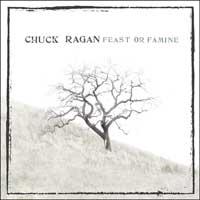Like a lot of other people in the punk and indie worlds, Chuck Ragan decided to start making acoustic music after the dissolution of Hot Water Music. But there's no risk of his new material coming across as a lukewarm Johnny Cash impression (I'm looking at you, Greg Graffin [Ut-oh! Controver-shee-ul shtatements! - ed.]). Chuck is doing what Chuck has always done: make incredibly honest and heartfelt music within the best of his abilities.
His post-HWM releases to this point have been criticized for his reliance on punk rock-style rhythm guitar, which he's obviously no stranger to. But barre chords don't always translate that well on acoustic guitar and some people derided the 7" single series from No Idea Records as nothing more than demo tracks that all sound the same.
The good news is, for the most part, that the problem has been rectified for his first studio album, Feast or Famine. The songs are heavily made-over, fleshed out with the help of extra instrumentation, guest players, and other vocalists.
Given the absence of all things ALL/Descendents in the past few years, it's good to see that Chuck is still working hard on carrying the "allular" torch. While he stops short of writing songs about food, he opens the record with an ode to the life of the fisherman. "The Boat" sees him planted in the middle of a torrential seastorm while looking for that day's catch. As with every song on the album, it focuses on Ragan's love for and appreciation of life itself. That's the main lyrical theme, as every song centers around family, passion, love, and Chuck's unwavering belief in a higher power. He's an unfailingly positive guy (with the exception of "For Broken Ears," a treatise against the government's handling of the Iraq war).
Plenty of songs here retain the bare-bones feel of the Blueprint Sessions, consisting of little more than acoustic guitar, Chuck's strong harmonica, and vocals. Those that receive extra instrumental flourishes could come across as too "country" for a lot of punk fans, but the fiddle and accordion that marks songs like "California Burritos" (a Rumbleseat classic that reaches its full potential here) and "Do You Pray" are more roots than country.
As for those guest players, some are used more effectively than others. Alkaline Trio frontman Matt Skiba's distinctive vocals are somewhat buried in the mix on the two songs he appears on ("The Boat" and "Do What You Do"), but that isn't necessarily a bad thing. It adds a certain ethereal, disembodied quality to the mix on the former, while the volume gets turned up a bit towards the end of the latter to nice effect. More successful are the contributions of Jolie Holland. Her voice is just as powerful as Ragan's and her harmonies add a fantastic counterpoint to his on the three songs she appears on.
It's not all perfect, though. A lot of songs have very similar tempos and strumming patterns, which can cause them to run together if you aren't paying close attention. The sequencing does what it can to interrupt that flow, throwing in slower cuts like "Geraldine" and "The Grove" every four or five songs. There are also some songs that might benefit from a smoother, more polished voice, as Ragan's guttural, raw vocals can come across a little too harsh for the music at times.
So while the spirit of the songs remains the same as his live and 7" releases, by dressing them up as best he (and his friends) can, Ragan has touched on a very solid, honest sound. It might be softer than Fuel for the Hate Game, but he remains undoubtedly one of the most inspiring musicians working today.
